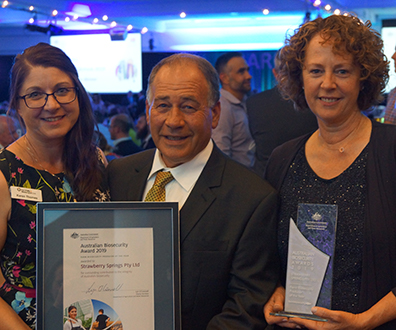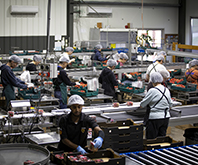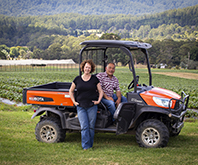Read the latest information on
Foot-and-mouth disease

Karen Thomas with Luciano and Heather Corallo at the awards dinner
Luciano Corallo, a strawberry grower in Victoria’s Yarra Valley, is one of two winners of the Farm Biosecurity Producer of the Year Award, which is part of the Australian Biosecurity Awards presented by the Department of Agriculture and Water Resources.
The Corallos were nominated for the award by Karen Thomas, Regional Agriculture Facilitator for the Port Phillip & Westernport Catchment Management Authority.
“They have demonstrated their commitment to ensuring their Strawberry Springs farm is a leader in industry best practice, quality assurance and biosecurity,” said Karen.
Luciano and Heather Corallo have a good understanding of on-farm biosecurity activities and apply them as best-practice preventative measures, rather than in response to specific threats. But even Luciano hadn’t realised how many biosecurity measures he had in place until he read the award nomination.
“Until I saw everything written down in one place, I didn’t realise how much we were actually doing,” said Luciano.
“We work biosecurity into everything we do, every day. That’s how it gets done. It’s just such a natural part of what we do to manage the property that it hadn’t occurred to me,” he said.
Luciano follows the six ‘essential’ principles of on-farm biosecurity.

The Strawberry Springs packing shed. Controlling people movement on-farm, particularly visitors to the U-pick section of the farm, is important to prevent the entry and spread of pests and diseases
For example, the main carpark has biosecurity signage to ensure visitors do not go beyond the main carpark. Running a ‘U-pick’ farm, this is important when the farm gate is open for business to ensure customers do not enter the production area.
Contractors and site visitors report at the main shed and need to use a foot bath or wear suitable protective gear (foot covers) when entering the production area to reduce the risk of cross contamination of pests and diseases such as charcoal rot. Only designated farm vehicles are used in the production areas.
But there are things that you don’t see displayed on signs that also matter.
Runner plants are supplied through accredited growers who provide certified disease-free planting material to ensure traceability. Likewise, records are maintained for any other inputs to ensure traceability and quality assurance through the supply chain.
As part of their integrated pest management approach to production, crop scouting is done during the growing season and records maintained for any management practices implemented as part of their program.
With regular scouting for IPM, they would soon know if there was a new pest or something wrong with the health of their plants. Pest and disease information is accessible to farm staff so that any possible issues can be reported.
The property adjoins the Yarra River and collaborates with Melbourne Water in the removal of willows, blackberries and other priority weeds and has undertaken revegetation of the river banks. Luciano appreciates the ecosystem services the riparian vegetation provides to the property.
“I’ve fitted low traction tyres to farm vehicles to minimise soil disruption and transfer of weeds and diseases around the property,” said Luciano.

Luciano and Heather Corallo
Feral animals are controlled, but wildlife is protected and viewed as a sign of good land health from a biodiversity perspective.
The farm adheres to strict quality assurance protocols to ensure market access is maintained. The packing shed follows strict food safety hygiene practices and storage sheds are clean and well maintained.
Fruit fly could also easily disrupt the access of his product to markets, and Luciano takes part in the Queensland fruit fly awareness program in the Yarra Valley. The farm has remotely accessed camera-based fruit fly traps as part of a sentinel detection network for the region.
Having seen the benefits for himself, Luciano is an advocate for proactive on-farm biosecurity practices amongst his peers. He plays an active and vocal role in encouraging others who attend industry events to also participate and be prepared to respond to a Queensland fruit fly outbreak.
Luciano has hosted biosecurity planning workshops with the strawberry industry, for the purposes of demonstrating the biosecurity practices used on his farm. He represents growers as a committee member of the Victorian Strawberry Growers Association, and one of two Victorian representatives on the board of the peak industry body, Strawberries Australia.
In these and other actions, Luciano’s commitment to applying best practice biosecurity measures across his farm is evident, placing high value on the economic, environmental and social returns from adopting a preventative approach.